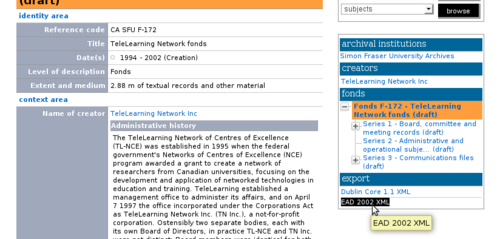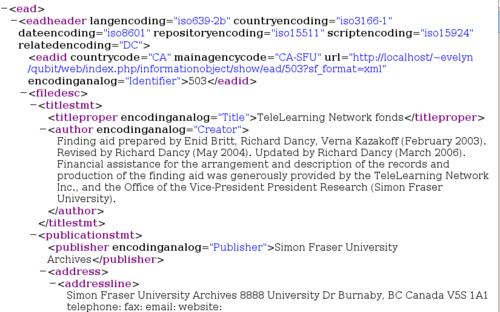Difference between revisions of "Export descriptions and terms"
| Line 1: | Line 1: | ||
<span class="pageTitle">Export descriptions</span> | <span class="pageTitle">Export descriptions</span> | ||
| + | |||
| + | [[Image:UM-6.3_1.png|500px|right|thumb|In the archival description view screen, select an export format]] | ||
| + | |||
| + | [[Image:UM-6.3_2.png|500px|right|thumb|Excerpt of exported description in EAD 2002 XML format]] | ||
| + | |||
[[Main Page]] > [[User manual]] > [[UM-6|UM-6 Import / export content]] > UM-6.3 Export descriptions | [[Main Page]] > [[User manual]] > [[UM-6|UM-6 Import / export content]] > UM-6.3 Export descriptions | ||
Revision as of 16:38, 30 October 2009
Please note that ICA-AtoM is no longer actively supported by Artefactual Systems.
Visit https://www.accesstomemory.org for information about AtoM, the currently supported version.
Export descriptions
Main Page > User manual > UM-6 Import / export content > UM-6.3 Export descriptions
ICA-AtoM allows users to export records in EAD, Dublin Core and MODS xml formats. Note that exporting in EAD format will result in associated child records, authority records and archival institution records being exported along with the archival descriptions.
1. Go to the view screen for the archival description you wish to export. For EAD export, go to the highest level of description. For example, to export a fonds and all its series and files, go to the view screen for the fonds-level description.
2. In the context menu box, under export click Dublin Core 1.1 XML, EAD 2002 XML or MODS 3.3 XML.
- Note that the MODS 3.3 XML export option is only available from the MODS view screen; for information on switching archival description templates, see UM-7.4.3 Select default templates.
3. The description will be exported to an xml format and displayed in your web browser window.
4. To save the xml export file, use your browser's save functionality. To exit the xml export file, click on your browser's back button.

